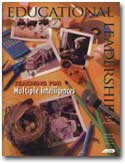At St. Patrick's Marist College—a Catholic secondary school in Dundas, New South Wales, Australia—a multiple intelligences-based program has generated many projects in the past year. An academically gifted 14-year-old learned the skills of horse dressage; a Year 8 student with learning difficulties demonstrated to the principal the model plane he had designed and built; and a group of girls and boys cooked family recipes (then tested them on the Head of Curriculum).
Each of these students has been pursuing independent projects for nearly two hours every two weeks in a program called Brain-Flex. Designed to encourage independent learning among early secondary school students, the program works as follows. Each student completes two or three projects during the year. These projects may be extensions of the same topic or completely different from one another. Staff teachers who volunteer as tutors encourage the students to use different intelligences at various times of the year, thus approaching the area of interest from a different context. This is what we call flexing: exercising a part of the brain that needs some development.
The state government defines our curriculum in formally structured syllabus documents. Brain-Flex is our attempt to carve out time in a busy schedule for students to learn for the sake of learning, not for the sake of the syllabus document.
Negotiating Topics
St. Patrick's faculty members—both Marist priests and lay teachers—continue two Marist Brothers traditions: the school is considered an extension of the family and the curriculum focuses equally on the physical, intellectual, moral, and spiritual development of the student.
Brain-Flex challenges students to stretch themselves beyond standardized methods of instruction. Once students have identified a topic of interest, they develop a learning contract with their tutor. (The 150 Year 8 students are organized into 14 groups of 10 or 11 students, with a tutor assigned to each group.) Students must explain in writing why they have chosen that topic and what they hope to learn. The topic must have enough depth and breadth to maintain learning for a double period (108 minutes) every two weeks.
After negotiating the contract, students attend four sessions on thinking and learning skills. They then are free to move around the college, with suitable supervision, to find the area most appropriate for their learning. Where possible, college personnel set aside facilities for their use—the library, the technology area, art rooms, computer rooms, and so forth. Other teachers or adults from the community serve as mentors, assisting and advising the students.
As students pursue their projects, they evaluate their own progress, based on the goals and standards they have set. At the end of the contract, they must present a brief summary of their learning. Some students have confronted the fact that they are good students in most classrooms, but lack the skills to work independently. A few have had to have this fact pointed out to them by their tutors.
Learning as You Like It
Brain-Flex grew out of a concern of our school's principal, Brother Peter Pemble. He observed that at our college and at other schools, Year 8 students were losing the motivation and momentum to learn. What these young people needed were skills that would help them make the transition from primary school to secondary school—and from there to postsecondary school and work.
- People learn best when the subject really interests them.
- People learn in different ways.
- How people learn must always be appropriate to what is being learned.
- Students develop as learners when they are responsible for their own learning.
Most of our Year 12 students must pass an external examination to graduate—the New South Wales Higher School Certificate. As a motivating force, the exam is no replacement for the early development of self-motivation and responsibility.
Further, our emphasis is on learning progress rather than achievement. We want students who otherwise might not shine in school to have an opportunity to experience success. Our Brain-Flex process is guided by each student's unique approach to learning—and unique needs.
Marton and Ramsden expressed our guiding philosophy when they defined learning as a qualitative change in a person's way of seeing, experiencing, understanding, and conceptualizing something in the real world rather than a quantitative change in the amount of knowledge someone possesses.
Our goal is the development of life-long learning skills and a love of learning.





